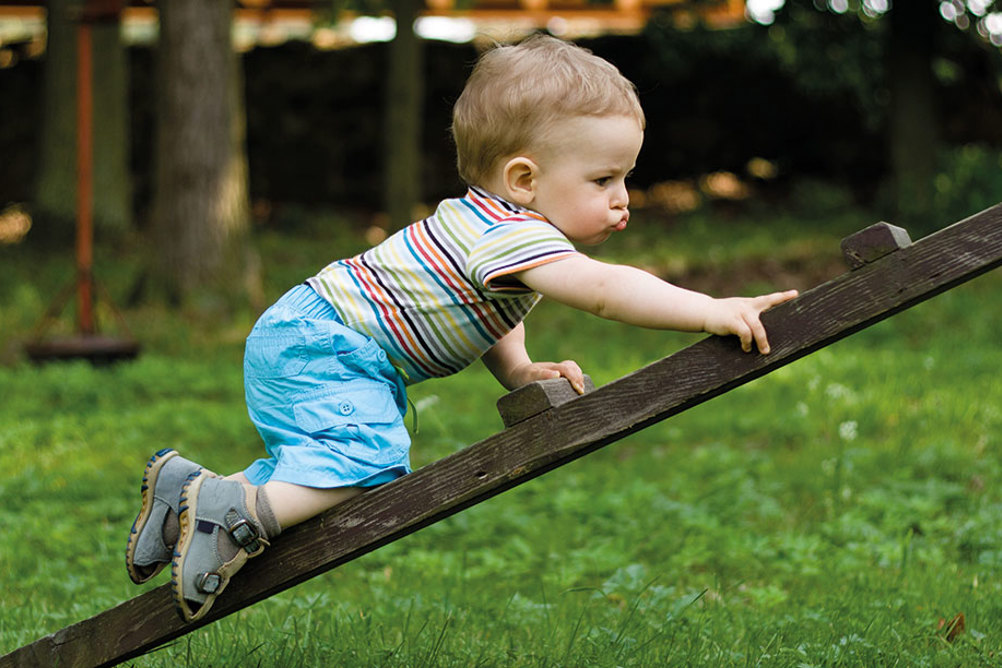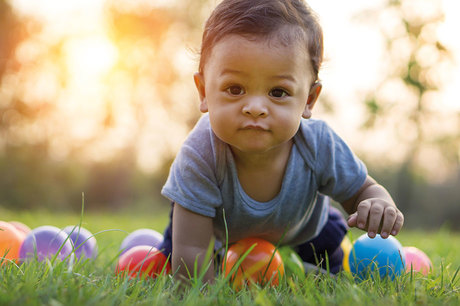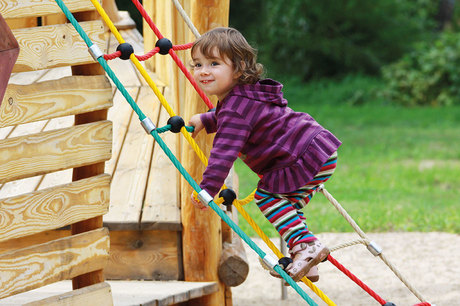
From very early on in life, children show a desire to move and explore. Babies quickly try to pull themselves up to standing, while two-year-olds are known for climbing up on furniture. It is almost as if young children have read the recommended physical activity levels of three hours a day for children aged nought to five years old.
In early years settings, play that requires physical movements is planned for, and is often known as ‘physical play’. Physical play is essential for children’s development and covers a wide range of activities including climbing, throwing, kicking and being on a tricycle.
FIVE THINGS YOU NEED TO KNOW ABOUT PHYSICAL PLAY
1. Healthy body, healthy mind
Physical play encourages children to move in a variety of ways. In doing so, children’s heart muscle is strengthened and weight-bearing exercise such as running, climbing and walking supports healthy bone development. Interestingly, children who are not physically active are more likely to struggle with sitting still, as the act of sitting requires good muscle control.
Physical play outdoors also helps set children’s body clocks, and so children are more likely to sleep well. As sleep is important in the formation of long-term memories, and so is essential for learning, the old adage ‘a healthy body, a healthy mind’ seems to make sense.
2. Spatial awareness, co-ordination and balance
Physical play helps children develop spatial awareness as they learn to move around objects and other people. It also helps them learn to judge speed and distance, which is important, when they are older, in learning to cross a road safely.
Children’s co-ordination is also developed as many of the skills involved in physical play require more than one movement. A good example of this is throwing. Not only does it involve a child moving their arm, it also requires them to balance their body and use their hands to release a ball.
3. Emotional development
Children gain hugely in confidence during physical play. You may find that your child often wants to show off what they can do, be it climbing to the top of a frame, going down a slide or shouting while cycling. Children also learn about the importance of perseverance through physical play. Skills such as steering a tricycle, throwing a ball or learning to catch require a lot of practice, and so children also have to learn not to give up.
4. Imagination
Young children often bring their imagination into their physical play. This often begins when they are around three years old. Children may pretend to be riding a horse, climbing up a castle or digging for treasure. Children may also use other props that they find outdoors to enrich the world that they have created for themselves, and so a scarf might be wrapped around the handlebars of a tricycle to bring magic powers.
5. Social development
Physical play encourages children’s social development. When children play together, they have to learn to share equipment and take turns. As they become older and play becomes more complex, they are likely to develop rules for certain games – for example, when a ball is in or out or who goes first.
Learning to make, keep and sometimes break the rules all contributes to children learning to be with others.
TIPS TO HELP YOUR CHILD ENJOY PHYSICAL PLAY
Parks and playgrounds
One of the best ways to help your child enjoy physical play is to take them to a park or playground regularly. It is worth trying to build this into a routine – for example, on the way back from nursery or before going to the supermarket.
Parks and playgrounds offer children more space and equipment than most of us can provide at home. Look out for playgrounds with climbing and balancing equipment as well as swings. Playgrounds will also help your child learn to strike up ‘instant’ friendships with other children. Knowing how to join others in play is a useful skill to develop.
Age and stage
As a parent, you could spend a fortune on buying equipment for physical play, but it is not really necessary. Key items to think about are a ball and, if possible, a wheeled toy appropriate for your child’s age and stage of development – for example, a sit-and-ride toy for an 18-month-old or a scooter for a three-year-old. Other items such as climbing frames and trampolines are not necessary.
Think about your child’s stage of development and avoid falling into the trap of getting something that they can ‘grow’ into. Equipment that is not within immediate grasp of the child can cause them to lose heart. If you buy second-hand equipment, check it has safety marks and that any moving parts are working well and are not rusted.
Encouragement
Whether it is learning to use a scooter, hit a ball or walk on a wall, your child may need encouragement. While it may be easy for you to see what they need to do next, remember that alongside advice, your child will need reassurance.
It is also worth recognising that children pick up skills at different rates, so don’t worry if you see other children of a similar age who appear to be more advanced. Bear in mind that practice makes perfect.
Joining in
Finally, it is worth remembering that children’s interest in physical play can also be triggered by parents. Families who routinely go for a walk, enjoy visiting the swimming pool and kick a ball around are more likely to have children who enjoy physical activity throughout their childhood and as adults.
Given that many adults do not reach the recommendations for exercise, the good news is that if you support your child’s health and development by joining in, you’ll be able to give yourself a pat on the back too!
MORE INFORMATION
www.nhs.uk/Livewell/fitness/Pages/physical-activity-guidelines-for-children.aspx
www.gov.uk/government/publications/uk-physical-activity-guidelines









